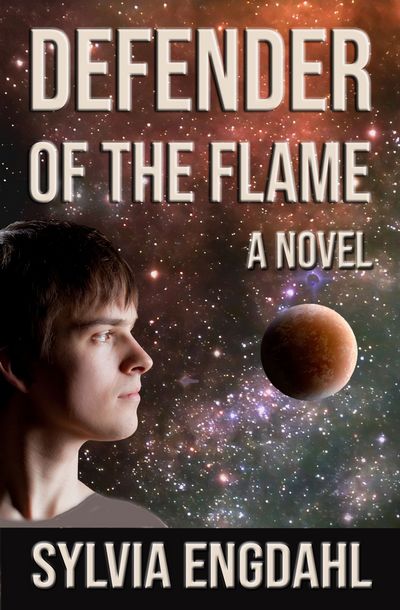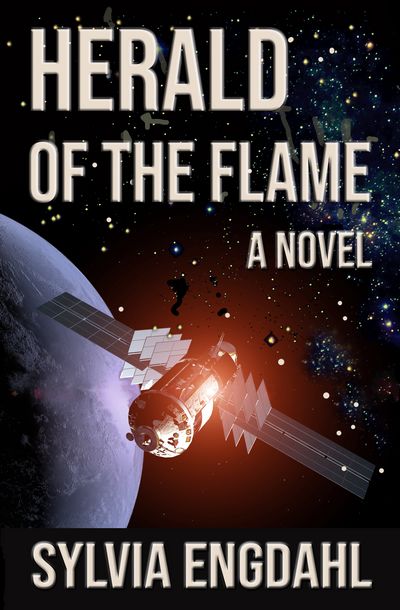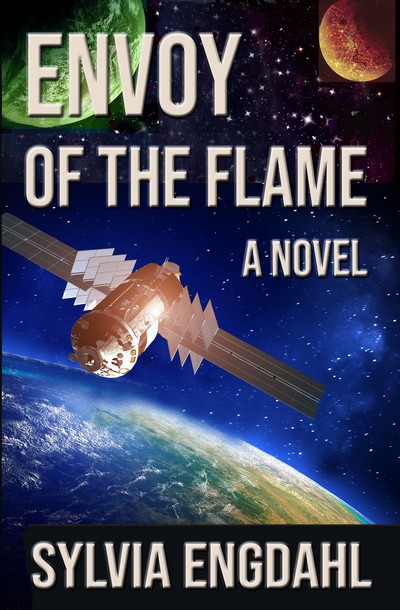
The Captain of Estel
by Sylvia Engdahl
An adult SF trilogy that may also be enjoyed by mature high school age readers
Book One: Defender of the Flame
Book Two: Herald of the Flame
Book Three: Envoy of the Flame
This is a story about the far-reaching influence of one man, originally no more than an ordinary space pilot, on the future of humankind. As a young starship officer Terry Radnor commits himself to defending the colony world Maclairn against enemies who oppose the spread of paranormal human mind powers, not guessing the grief this will bring him. Torn away from his wife and once-promising career after learning a secret too deep for its disclosure to be risked, he is forced to build a new life in exile without hope of`honoring his pledge. Yet through a series of seemigly meaningless incidents, fate puts him in place to confront the colony's greatest peril, and ultimately leads him, as captain of his own ship
Estel, to a destiny far greater than he has ever imagined--a destiny which, due to the impact of his legacy on his successors, will revitalize the declinig civilization of Earth.
Only the first two books, the story of Terry's long and momentous lifr, are in the omnibus edition. All three books are available separatrly in ebook, papertback, audiobook editions.
|
"The book profits from Engdahl’s long experience as a professional writer, assuring an engaging read." --Brenncke's Review Blog
|
"Reaches back to the brio and speculation of Engdahl's classic books of the Seventies." --Literary critic Nicholas Birns
|
"These novels are not so much genre . . . 'Science Fiction' as they are Literature. These are novels about life." --Jacqueline Lichtenberg
|
Purchase an ebook copy of The Captain of Este from
Amazon,
Amazon UK,
Barnes & Noble,
Apple Books,
Kobo,
Smashwords, or
Google Play.


See a description and purchase links for Defender of the Flame.
See a description and purchase links for Herald of the Flame.
See a description and purchase links for Envoy of the Flame.

See more quotes from reviews.
Read an excerpt from Defender of the Flame.
Read an excerpt from Herald of the Flame.
Read an excerpt from Envoy of the Flame.
Frequently Asked Questions
Defender of the Flame and Herald of the Flame are a complete atory about the whole life of their hero. Must Envoy of the Flame be read to finish the story?
Only if you want to know about the major influence his life had on the future of Earth. It was published seven years later and has a different protagonist, a young woman. Although some of the other characters are the same and its plot depends on events in the first two books, these are fully explained, so it can stand alone. If you plan to read all three, however, you should not read it first since it contains many spoilers.
Should Stewards of the Flame and Promise of the Flame, which were written first and are set earlier in time, be read before this trilogy?
Absolutely not, unless you definitely plan to read all five books and want to avoid the spoilers for them that appear in its backstory. There are two complelely independent and very different stories with different characters that take place centuries apart, Though many people enjoy the, firsr one, they're not always the same people as those most apt to enjoy this faster-moving and less controversial book,
Some time ago I realized that for this reason it had been a mistahe to use "Flame" in all five titles. No matter how much I said to the contrary, most people either assumed they would have to begin with
Stewards of the Flame and didn't want to start such a long series, or they did start there and didn't like it well enough to go on. Ordinarily authors promote the first book in a series, often making it free, in order to encourage people to read the following books. In my case this backfired, though it couldn't have been avoided because
Stewards of the Flame was published first. If I had written
Defender of the Flame first it would have reached far more readers
So in an attempt to start over I produced an omnibus edition of this trilogy containing all three of its books, giving them new titles to make clear that they are separare from the other "Flame" books. But very few people ownloaded it even when it was free. Its eztreme length may have have been discouraging, or its description may have made it look too long and complicated to embark upon. I have withdrawn it n favor of rhe present arrangement--Terry's two-part life story in an omnibus plus its aftermath in the separate edition alone.
Why did you earlier change the original series name from "The Rising Flame" to "The Captain of Estel"?
The orginal series names "The Hidden Flame" and "The Rising Flame" were the only labels I could think of when i wanted to make plain that the four (now five) "Flame" novels are two separate stories despite the books' similar titles/ Few readers want to start with a book labeled No. 3 or No. 4 in a series. Also, it's generally impossible to get reviewers to read a book that is not the first in its series. And finally, the trilogy is less unsuitable for teens than the two earlier books.
But those series names were not very interesting, and it occurred to me tater that "The Captain of Estel" would give a better idea of what the trilogy is about -- Book One is about the hero's youth before he acquired the starship
Estel, Book Two is about his life as its captain, and Book Three is about the impact of his legacy on humankind after his death in old age. So I also had to think of a name for the duology
Stewards of the Flame and
Promise of the Flame although its two books aren't as similar to each other. "The Founders of Maclairn" doesn't give much idea of the story but at least indicates that it's set in a different era.
What makes these novels unsuitable for middle-school readers?
They contain some mild sex and profanity to which parents of young readers might object, especially since I'm known as a YA author and those familiar with my books don't expect it. They also include discussions of the connection between sex and telepathy that would be confusing to readers too young to know much about ordinary sex, and in the third book, discussion of medical aspects of a sexual union. Moreover, if kids read this triogy they might want to go back to the earlier books, which are even less appropriate for them because of the middle-aged hero and some of the events included.
Mature high school age readers, however, may enjoy this trilogy, as the hero is in his early twenties at the beginning of the story and his later life doesn't involve anything that wouldn't interest them. Nevertheless, in publicity I can't say so because my experience has been that when I call a book suitable for high school, people give it to middle-school children anyway. (This has happened with the second and third books of the Children of the Star trilogy, which most younger teens are bored by.) So I have to emphasize the fact that none of the Flame books are YA novels, which is not going to discourage older teens from reading them since most high school kids read adult science fiction in any case.
Is Defender of the Flame a complete story or does it end with suspense that makes it necessary to read the sequel to find out what happened?
It's a complete story. I didn't know there would be a sequel until long after it was published. Then suddenly it occurred to me what might logically happen to the hero when he was an old man, and I was excited by it and eager to tell my readers. I wrote
Herald faster and with less difficulty in thinking of events than any of my other books, though I had to cover his whole later life and make them up as I went along. A lot of things fit in as if they'd been planned when I was writing the first book about him, but they weren't.
If it's separate, can I read Herald of the Flame if I haven't read Defender of the Flame?
It can stand alone, but it wouldn't be a good idea to read it first because it includes enough backstory to completely spoil the suspense of
Defender. Also, you will know the hero better if you have gotten acquainted with him by reading abut his earlier life.
Why do you say that the trilogy will be especially interesting to older readers who liked Enchantress from the Stars and The Far Side of Evil?
In part because they deal with the same psi powers that Elana's people possessed, though less developed than they were by her people. For years I felt that to explain the main relationship, which is that they involve the Service that appears in the Elana novels, would be a spoiler; but as a result many people who would have liked to know more about the Service didn't read
Defender of the Flame and its sequel
Herald of the Flame. So with the publication of the third book
Envoy of the Flame, which deals more extensively with the Service, I decided to mention it.
The worlds in the "Flame" novels, unlike those in your YA novels, were colonized by people from Earth, though in the past you avoided writing fiction about Earth's future (except for the colonization of Mars). Why did you decide to do so?
I haven't wanted to write stories about things that I don't think could happen here, or would be extremely disastrous if they happened--for one thing because I want all my fiction to be consistent. But
Stewards ot the Flame was a different type of story, deliberately exaggerated to make a point about where I think certain trends in our society would lead if carried to their logical conclusion. It would be less effective if it involved an imaginary human species, as my previous novels do, instead of our own. And the other Flame novels are about the same characters as those in
Stewards, or their descendents, so they are also about our own species. That doesn't lead to any inconsistencies because I do believe that developing psi powers is the next step in our future evolution.
Do you really think conditions on Earth in the future will be as you describe them in Defender of the Flame and its sequels?
Yes. I think there will be an era when Earth is overcrowded and most of the enterprising people have gone to the colonies, and those left are too frustrated and depressed to make much effort because they have no real challenges and the government controls too much. The challenge of developing psi powers, and ultimately contact with extraterretrial civilizations will in time lift them out of depression, but it will be a slow processs. And there will indeed be violence on the part of those who fear to acknowledge that psi is real, or who realize that it will free people from control by entrenched authorities. In the more distant future--long past the end of the story--conditions on Earth will improve and its beauty will be restored; still the colonies will always be at the forefront of our civilization.
Why did you include your long-ago story "The Beckoning Trail" as a Prologue in Envoy of the Flame?
Because it is the foundation of the novel and was my inpiration for it. It's about what happened to the characters in that story, which had an open ending, after the story's conclusion. Someone one once commented to me that the story wasn't consistent with
Herald of the Flame athough I had said all my novels are consistent in that nothing in any of them conflicts with another, even where they're not related. And my reaction was that since it's a short story it doesn't disprove my statement about my novels. But long afterward, I got to thinking that there was no reason why there couldn't be events that make it consistent, and those events would answer a question I had never answered in my own mind about what happened after the conclusion of
Herald. So the Prologue is an integral part of
Envoy of the Flame and its heroine, Ardith, is the protagonist of the novel.
Why has the original edition of Envoy of the Flsme been withdrawn?
Fifteen months after its publication I withdrew the original edition of this novel and offered free copies of the revised ebook to readers who had bought it. (The offer is still good via Smashwords coupon ZX97X. I fear that many buyers haven't heard about the new edition, which was announced only on my website and Facebook).
The problem was that I wrote the book too fast; when I was alone in my room in a care facility all day, excited about having an idea for a novel when I'd never expected to get another, I finished it in a few months. It never had a chance to get "cold" so I could read it objectively. When I reread it after passage of time I was stunned by the deficiencies in it, which I could hardly believe I hadn't noticed earlier. There were a lot of places that needed elaboration or clarification, as well as minor statements that were inconsistent or unreasonable. More importantly, I was dismayed to see that the Service, which in my previous books I portrayed as wise and compssionate, came across as an unfeeling bureaucracy because I hadn't explained what lay behind a decision that on the surface appeared to be mere adherence to an inflexible policy, nor had I made its expected impact on the hero clear. There's a lot about the Service in the Captain of Estel trilogy, and I don't want adult readers of the Elana books to feel let down.
I am still somewhat dissatisfied with the book. Its climax is a bit too pat to be credible as the resolution of an issue central to humankind's future. There are parts of the story that need more depth. And as a whole, it fails to convey the feeling that what the characters are shown of the elder worlds is only a glimpse of a culture far beyond their (or my own) present comprehsion .Hopefully readers will realize this and be aware that Earth's eventual contact with extraterrestrals will be more mind-boggling than can be suggested by a short novel.



